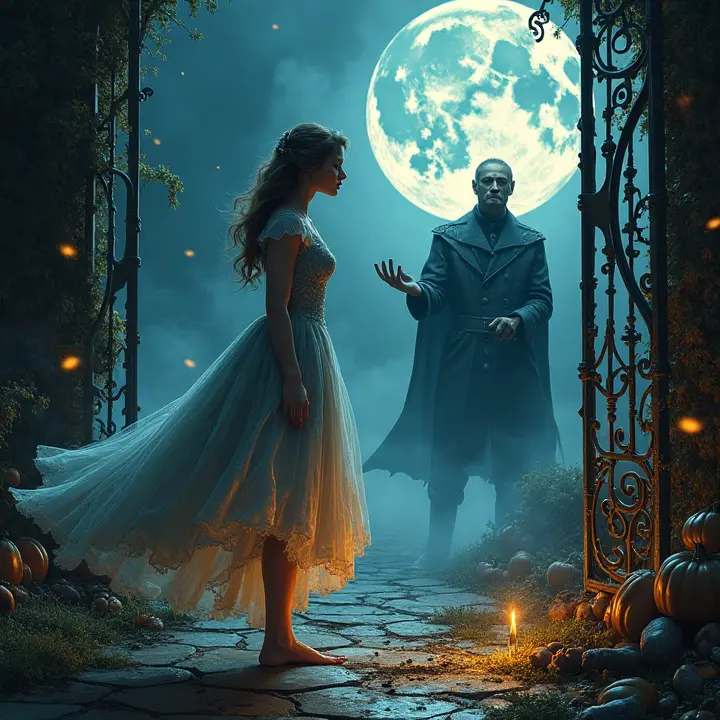The clock tower chimed eleven, and Cinderella’s slippers sank deeper into the palace garden’s moss. Silk gloves clung to her sweating palms as she stared at the prince-his smile rehearsed, his laughter a hollow echo against the marble walls. For weeks, she’d rehearsed this moment in her head: the grand romance, the escape from cinders and cruelty. But now, as he lifted her hand to his lips, all she felt was the weight of the lie she’d worn since the ball. 
“You’re trembling,” the prince murmured. His thumb brushed the scar on her wrist-a mark left by a stray ember years ago, hidden beneath lace and longing.
Cinderella pulled away. The garden’s night-blooming jasmine smelled cloying, not sweet. “Midnight is a curious hour,” she said, her voice steady for the first time all evening. “It doesn’t just transform pumpkins or mice. It¡ *unmakes* things.”
He frowned. “What are you talking about?”
She stepped back, letting the moonlight wash over her. The glass slippers, so delicate in stories, pinched her toes. The gown, stitched with her stepmother’s stolen pearls, scratched like a cage. “That night at the ball,” she began, “your guards nearly caught me. Did you know? I lost a slipper not because I was fleeing enchantment, but because I *stumbled*. The stairs were too narrow, the crowds too thick. And your footmen¡ they grabbed my arm so hard it bruised.”
The prince’s smile faltered. “You never told me this.”
“Would it have mattered?” She laughed, a brittle sound. “You wanted the girl who fit the slipper, not the one who bled into her ashes.”
—
Years earlier, in a attic room that reeked of damp wool and resentment, Cinderella’s stepmother had taught her a lesson sharper than any slap: *”Magic is for fools. Survive on your wits, or don’t survive at all.”* So when the fairy godmother appeared-a woman with moth-eaten wings and a flask of gin-Cinderella hesitated.
“I don’t need a carriage,” she’d said, eyeing the wand warily. “I need a key. To the cellar where they lock the wine. If I steal enough, I could buy passage to the port.”
The godmother blinked. “Child, I’m here to grant wishes, not enable petty crime.”
“Then you’re wasting both our time.”
But the old fairy had grinned, toothless and bright. “Ah. You’re *interesting.* Let’s make a different deal.”
—
The prince reached for her again, but Cinderella sidestepped, her slippers crunching gravel. “You asked why I didn’t return after the ball,” she said. “The truth? I did. I came back the next night, and the next. Not for you-for the palace library. Your scribes keep records of every ship’s manifest, every trader’s license. I copied them by candlelight while you danced with barons’ daughters.”
His face paled. “You used me.”
“No,” she said softly. “I survived. Just like you used me to placate your council. A peasant bride makes such a charming tale, doesn’t it? Distracts from the tariffs you’re raising on the docks.”
—
The fairy godmother’s magic had come with a price, of course. Not a curfew or a pumpkin’s decay, but a question: *”What will you sacrifice to stay alive?”*
Cinderella chose her voice.
For one night, she’d be mute-unable to utter her name, her past, or her plans. A fair trade, she’d thought, for access to the palace. But as the prince twirled her across the ballroom, his fingers digging into her silent throat, she realized the cost: without words, she’d become a mirror, reflecting only his fantasy.
—
Now, in the garden, Cinderella untied her slippers. The prince watched, stunned, as she tossed them into the ornamental pond. “The glass was a lie,” she said. “They’re just shoes. And they hurt like hell.”
“Where will you go?” he demanded, as she turned toward the gate.
She glanced over her shoulder, barefoot and grinning. “Somewhere I can finally *breathe*.”
The godmother waited by the stables, a rusted ship’s compass in hand. “Took you long enough,” she grumbled, though her eyes sparkled.
Cinderella hoisted herself onto the stolen horse. “You knew I’d hate the palace.”
“I knew you’d hate pretending more.” The fairy tossed her a cloak. “Now ride. The tide waits for no one, and neither does freedom.”
—
And so Cinderella left the parable behind-the prince, the slipper, the “happily ever after” etched in someone else’s script. Some say she opened a tavern by the docks, serving spiced rum and smuggling silk. Others swear she captains a ship, her compass needle spinning wild and true.
But in the quiet hours, when the clock nears midnight, mothers whisper this to wide-eyed daughters: *The best magic isn’t found in wands or wishes. It’s the moment you realize your own feet can carry you further than any enchanted carriage.*
Sleep well, dear one. And remember-your story is yours to rewrite.
(Word count: 626)
—


